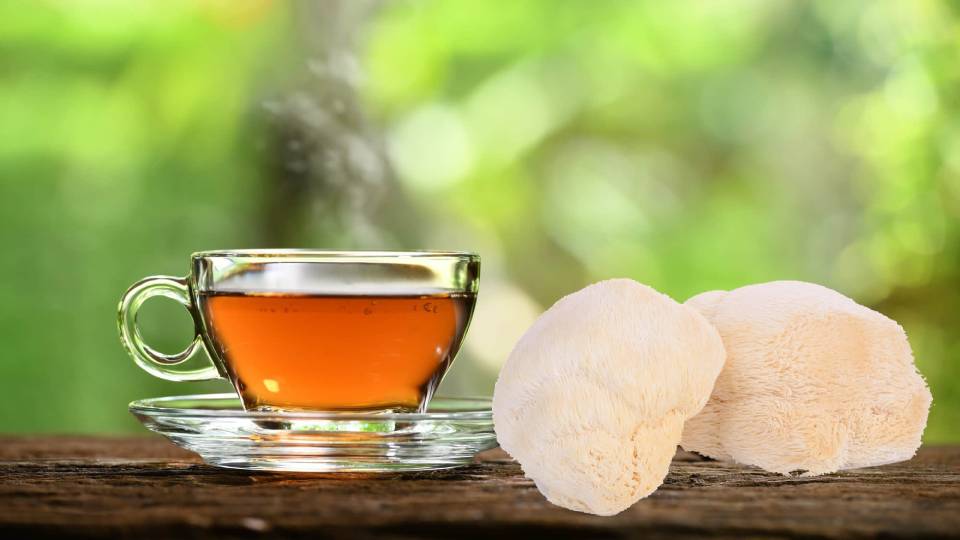Top 3 Best Lion’s Mane Tea Recipes
Lion’s Mane tea, a delightful and convenient beverage, offers a unique opportunity to unlock the benefits of this remarkable fungus. With its powerful brain-boosting properties, Lion’s Mane mushroom naturally aids memory, brain function, and mental focus.
In this article, we’ll explore the marvels of Lion’s Mane mushrooms. We’ll unveil the top three best Lion’s Mane tea recipes, including two fantastic smoothie recipes. We’ll also delve into its benefits, potential side effects, and the latest scientific research on this fascinating mushroom. So, let’s jump right in!
In this article:
What Does Lion’s Mane Tea Taste Like?
Lion’s mane tea boasts an earthy flavor with a subtle hint of bitterness and a chocolatey undertone. It can be savored as is or customized with herbs and spices for an enhanced taste experience. It offers a mild savory taste reminiscent of miso soup.
You can find them in tea bags, powdered extracts, and tinctures. This versatile drink combines the essence of mushroom broth with the comforting qualities of tea. It’s soothing and enjoyable, providing a delightful way to experience the potential benefits of this remarkable mushroom while savoring a soothing and flavorful cup.
How to Make Lion’s Mane Tea
If you love tea or simply have a curiosity about this distinctive mushroom-infused drink, we’re here to guide you through the process of making Lion’s Mane tea. Step by step, we’ll explore its earthy aroma and the potential cognitive benefits it offers. Get ready for a delicious and enlightening journey as we delve into the art of brewing a perfect cup of mushroom tea.
3 Best Lion’s Mane Tea Recipes
Traditional Lion’s Mane Tea
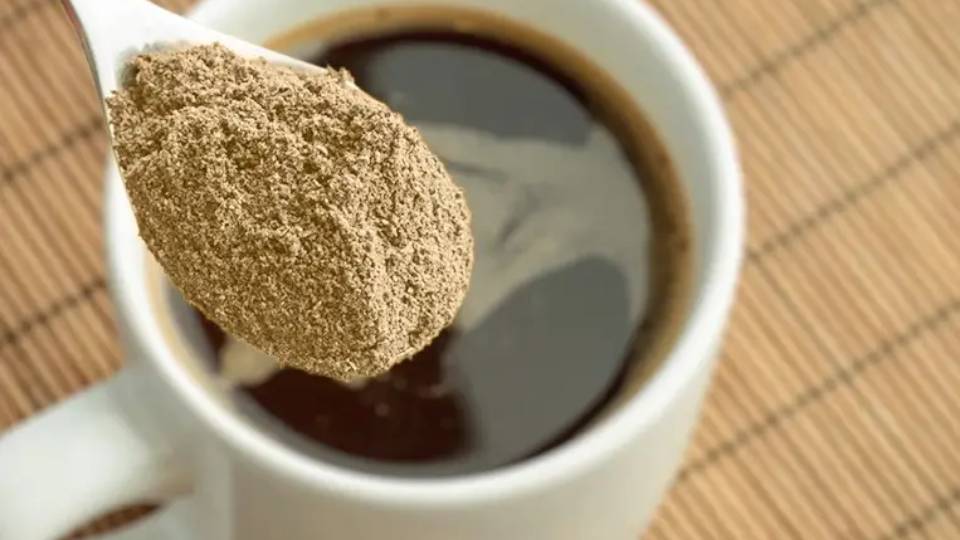
Ingredients
Instructions
- Boil water in a kettle or pot over the stove.
- Let the boiling water stand/cool off for 30 seconds.
- Place hot water (off the boil) and a serving of Lion’s Mane extract powder in a cup.
- Stir thoroughly. Enjoy the warm and comforting flavors of Lion’s Mane tea.
Lion’s Mane Matcha Tea
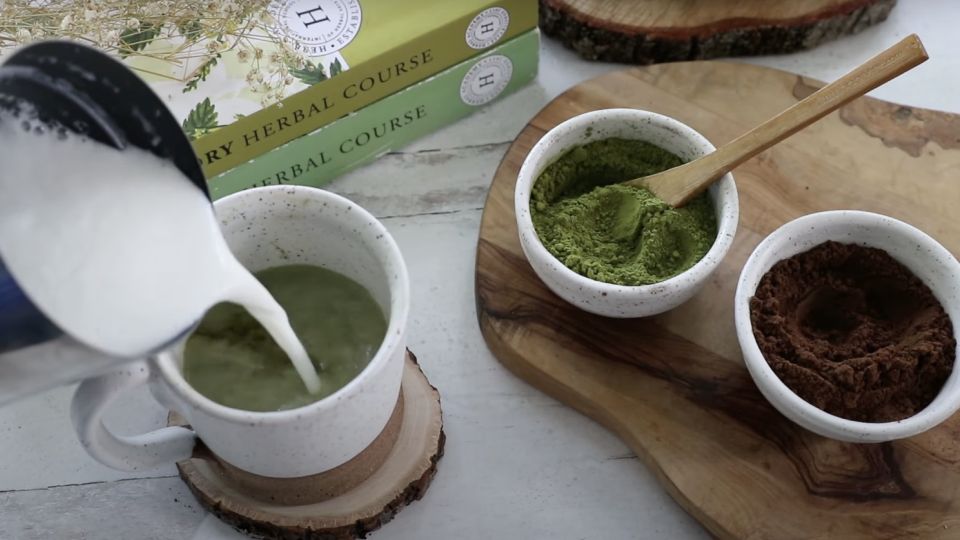
Ingredients
Instructions
- Add Lion’s Mane mushroom powder and matcha powder to a mug.
- Pour hot water over the powders and stir until well combined.
- Heat your non-dairy milk of choice in a pot
- Place the hot milk in a blender or use a milk frother
- Add honey or sweetener of choice to taste.
- Enjoy!
Vegan Golden Milk Tea With Lion’s Mane

Ingredients
Instructions
- In a small saucepan, combine the coconut milk, almond milk, honey, and coconut oil.
- Heat the mixture over medium heat until it starts to simmer.
- Add the turmeric, cinnamon, black pepper, and ginger to the saucepan and stir well.
- Reduce the heat to low and let the mixture simmer for 5-10 minutes.
- Remove the saucepan from the heat and let it cool for a few minutes.
- Add the Lion’s Mane extract to the saucepan and stir well.
- Pour the golden milk into a mug and enjoy!
Other Ways to Consume Lion’s Mane
Apart from Lion’s Mane tea, you can enjoy this powerhouse mushroom in smoothies, soups, and more. Blend it into a brain-boosting smoothie, or add it to a nourishing soup for a delightful and nutritious experience. Additionally, we offer other adventurous Lion’s Mane cooking recipes.
Lion’s Mane Smoothie Recipes
Matcha Lions Mane Smoothie
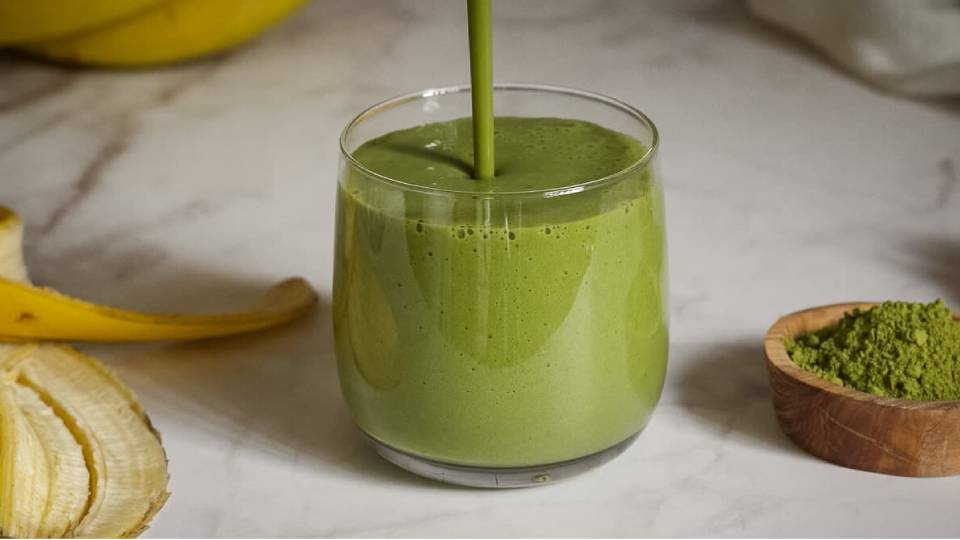
Ingredients
Directions
- Combine all the ingredients in a blender, and blend until smooth. Enjoy!
Brain Boosting, High Protein, Dairy-Free Superfood Smoothie

Ingredients
Directions
- Combine all the ingredients in a blender, and blend until smooth. Enjoy!
You can mix Lion’s mane mushroom powder or tincure into any smoothie.
What is Lion’s Mane Mushroom?
Lion’s Mane Mushroom, scientifically known as Hericium erinaceus, is a unique and fascinating organism that captivates both culinary enthusiasts and health-conscious individuals alike. With its distinctive appearance resembling a lion’s mane, this edible and medicinal fungus has garnered widespread recognition and popularity. Not only does it offer a delightful seafood-like flavor, but it also boasts an array of potential health benefits[1].
Rich in bioactive compounds, Lion’s Mane Mushroom has been associated with promoting brain health, supporting the immune system, and even potentially aiding in nerve regeneration. Moreover, its versatile nature allows it to be enjoyed in various forms, including fresh, cooked, dried, or even steeped as tea. So, whether you’re seeking to tantalize your taste buds or explore its potential medicinal properties, Lion’s Mane Mushroom is a remarkable ingredient to incorporate into your culinary adventures.
Lion’s Mane Benefits
Lion’s Mane offers a range of benefits that can positively impact your overall well-being. Here are some of its remarkable advantages:
- Enhances brain health and cognition: Lion’s Mane stimulates brain function, boosts memory, and enhances mental clarity.
- Supports nerve growth and regeneration: It aids in the development and protection of nerve cells, promoting optimal nervous system function[2].
- Promotes a healthy immune system: Lion’s Mane strengthens your immune system, helping to ward off infections and diseases[3].
- Reduces inflammation and oxidative stress: It possesses anti-inflammatory properties, reducing inflammation and protecting cells from oxidative damage.
- Improves digestive health: Lion’s Mane supports a healthy gut by promoting the growth of beneficial gut bacteria and aiding in digestion[4].
- May protect against ulcers and gastric damage: Research suggests that Lion’s Mane may help protect the stomach lining and reduce the risk of ulcers[5].
- Enhances overall well-being: By supporting brain, nerve, immune, and digestive health, Lion’s Mane contributes to a balanced and thriving body.
Incorporating Lion’s Mane into your routine can offer numerous health benefits, making it a valuable addition to your wellness journey. Ensuring that you obtain your Lion’s mane products from a trustworthy source is the key.
Compounds of Lion’s Mane Mushroom
Lion’s Mane mushroom contains a rich array of bioactive compounds that contribute to its potential health benefits. Let’s explore some of the key compounds found in this mighty mushroom:
| Compound | Potential Benefits |
| Hericenones | Enhance cognitive function |
| Erinacines | Promote nerve growth |
| Polysaccharides | Support immune system |
| Antioxidants | Reduce oxidative stress |
| Anti-inflammatory | Combat inflammation |
The table above provides a summary of the key compounds in Lion’s Mane mushroom and their potential benefits.
Lion’s Mane Side Effects
In general Lion’s Mane is considered safe for most individuals when consumed in moderate amounts. However, some individuals may experience mild side effects, including allergic reactions, digestive issues, or skin irritation. If you are allergic to mushrooms or have any known allergies, it is advisable to exercise caution when consuming Lion’s Mane. So, If you experience any adverse effects, discontinue use and consult a healthcare professional.
How to Prepare and Consume Lion’s Mane Tea
Preparing and consuming Lion’s Mane tea is a simple and enjoyable process. Following these tips can simplify your mushroom tea experience:
- Choose high-quality Lion’s Mane mushrooms: Select fresh or dried Lion’s Mane mushrooms from a reputable source. Ensure they are free from contaminants and of good quality.
- Clean and chop the mushrooms: Gently clean the mushrooms using a brush or damp cloth to remove any dirt or debris. Then, chop them into small, manageable pieces for brewing.
- Brew the tea: Place the chopped Lion’s Mane mushrooms in a pot of hot water and simmer for about 20 minutes. This allows the beneficial compounds to infuse into the water.
- Strain and serve: After simmering, strain the liquid to separate the mushroom residue. You can sweeten the tea with honey or add a squeeze of lemon for flavor if desired.
- Recommended dosage: Start with a small amount, such as 1-2 cups of Lion’s Mane tea per day, and gradually increase the dosage if desired. Listen to your body and adjust accordingly.
Remember, it’s always advisable to consult with a healthcare professional before incorporating Lion’s Mane or any new herbal remedy into your routine, especially if you have underlying health conditions or are taking medications.
Research and Studies on Lion’s Mane Mushrooms
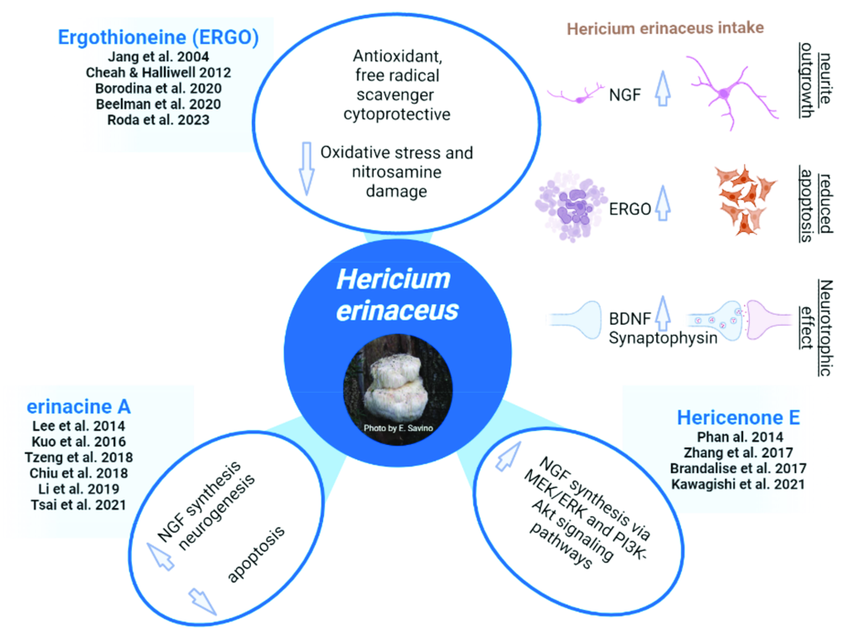
Scientific research has explored H. erinaceus for its potential in treating nervous system diseases. Many studies have shown that it can offer promising complementary treatment options and serve as an alternative for conditions like depression and cognitive disorders. Due to its robust neuroprotective properties, it’s also being considered for use in conditions like Alzheimer’s disease and post-traumatic brain injuries.
1. Animal studies
Animal research has demonstrated promising results, showing that lion’s mane mushroom extracts have neuroprotective effects, promoting the growth and regeneration of nerve cells. These studies suggest that the lion’s mane may have the potential to support brain health and function.
2. Human studies
Some research suggests that lion’s mane may enhance cognitive function, memory, and focus. It has also shown potential in reducing symptoms of anxiety and depression. However, more rigorous human studies are needed to establish definitive conclusions.
3. Neurological conditions
Preliminary studies indicate that Lion’s mane may hold promise in managing neurodegenerative conditions like Alzheimer’s and Parkinson’s disease[6]. The compounds present in lion’s mane mushrooms have shown protective effects against nerve cell damage and inflammation associated with these conditions.
4. Future research
Ongoing research is focused on unraveling the mechanisms behind Lion’s mane’s potential benefits and exploring its applications in other areas, such as gut health and immune function.
While the research is encouraging, it’s important to recognize the current limitations and await further scientific investigations to fully understand the benefits and limitations of lion’s mane tea.
FAQs
Can You Put Lion’s Mane in Tea?
Yes, you can put Lion’s Mane in tea. Simply steep dried Lion’s Mane mushroom slices in hot water for 10-15 minutes, then strain the tea and enjoy. Lion’s Mane tea offers a unique flavor and potential health benefits, making it a delightful addition to your daily routine.
What is Lion’s Mane Tea Good For?
Lion’s Mane tea is believed to be good for promoting brain health, enhancing cognitive function, and potentially aiding in the prevention of cognitive impairments such as Alzheimer’s disease. It may also have anti-inflammatory properties, support the immune system, and help regulate blood sugar levels. Enjoy the potential benefits of this remarkable tea!
What are the Side Effects of Lion’s Mane Tea?
The side effects of Lion’s mane tea include allergic reactions, digestive issues, or skin irritation. If you have allergies or sensitivities to mushrooms, it’s best to be cautious. Lion’s Mane tea is generally safe for most people. If you notice any adverse effects, discontinue use and consult a healthcare professional.
Is it Safe to Take Lion’s Mane Every day?
Yes, it is generally safe to take Lion’s Mane every day. It is a natural dietary supplement that can be consumed regularly. However, it’s always a good idea to start with a lower dosage and gradually increase it to assess your body’s response. If you have any concerns or medical conditions, consult a healthcare professional.
Does Lion’s Mane Increase Testosterone?
Lion’s Mane has no direct effect on testosterone levels. It’s primarily known for its potential cognitive benefits and overall health support. If you’re looking to address testosterone-related concerns, consult a healthcare professional for appropriate guidance and solutions.
Summary
Lion’s Mane tea, derived from the magnificent Lion’s Mane mushroom, offers a unique and delicious way to harness the potential health benefits of this extraordinary fungus. With its potential to support brain health, promote cognitive function, and offer anti-inflammatory properties, Lion’s Mane tea has garnered attention worldwide. While research on Lion’s Mane mushroom is still ongoing, preliminary studies suggest its numerous benefits. By following simple preparation methods and exploring creative recipes, you can enjoy the delightful flavors and potential health perks of Lion’s Mane tea.
References
1. Therapeutic Potential of Hericium erinaceus for Depressive Disorder. Retreived from https://www.ncbi.nlm.nih.gov/pmc/articles/PMC6982118/
2. Hericenones and erinacines: stimulators of nerve growth factor (NGF) biosynthesis in Hericium erinaceus. Retrieved https://www.tandfonline.com/doi/full/10.1080/21501201003735556
3. Polysaccharides from Hericium erinaceus Fruiting Bodies: Structural Characterization, Immunomodulatory Activity and Mechanism. Retrieved from https://www.ncbi.nlm.nih.gov/pmc/articles/PMC9503163/
4. Effects of Hericium erinaceus powder on the digestion, gelatinization of starch, and quality characteristics of Chinese noodles. Retrieved from https://onlinelibrary.wiley.com/doi/10.1002/cche.10387
5. Digestive Characteristics of Hericium erinaceus Polysaccharides and Their Positive Effects on Fecal Microbiota of Male and Female Volunteers During in vitro Fermentation. Retrieved from https://www.ncbi.nlm.nih.gov/pmc/articles/PMC5492111/
6. Hypolipidemic Effect of an Exo-biopolymer Produced from a Submerged Mycelial Culture of Hericium erinaceus. Retrieved from https://www.tandfonline.com/doi/abs/10.1271/bbb.67.1292

